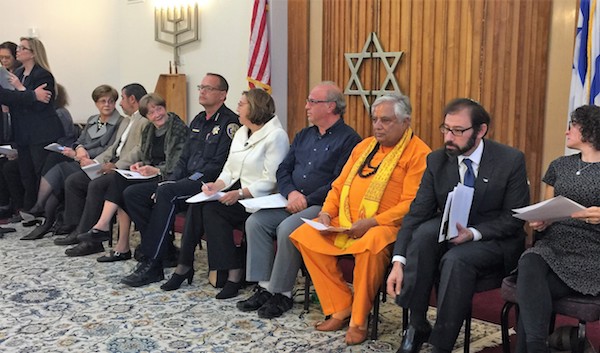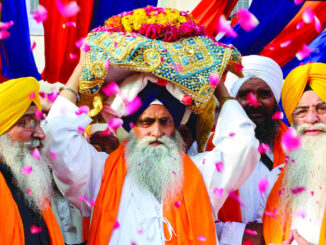
Guru Nanak was an extraordinary human being and a social reformer. Born on the full moon night in the month of Kattak (Kartik) in 1469 in a nondescript village “Talwandi” ( Rai Bhoin Di Talwandi) in a middle-class trader-agricultural family some fifty miles to the West of the Provincial Capital of Lahore, Guru Nanak from his infancy showed signs of being markedly different from the children of his age. His father Kalyan Dass Mehta (sub-caste Bedi) was a landlord of substance. But he wanted his son to be a trader. Seeing his son always detached from the daily goings on and immersed in deep contemplation, his father wanted to engage Nanak in a more remunerative and lucrative profession of commerce. One day Kalyan Dass gave twenty rupees to Nanak to do some business.
In today’s terms this was a fabulous amount of money running into thousands of rupees. Nanak expressed no inclination to buy and sell commodities for profit. He looked at suffering humanity all around. Some were rolling in affluence and the others were mal-nutritioned and hungry. On seeing some hungry faces, he spent the money on buying, cooking and serving food to the needy. By doing so Nanak sent a strong signal about his mission in life to his father. Seeing his son Nanak neither inclined towards farming nor towards trade and commerce, his father sent him to live and work with his daughter Nanaki, some one hundred and fifty miles to the East in a small Islamic garrison town of Sultanpur Lodhi in Bist Doab region of Punjab. India at that time was ruled by the “Lodhis” a West Asian Islamic Dynasty. Ibrahim Khan Lodhi was ruling in Delhi and his close relative Daulat Khan Lodhi was the regional governor at Sultanpur Lodhi. Daulat Khan gave an employment to Nanak in his provision store (Modi Khana). A highly compassionate Nanak sometimes gave some of the ration free of cost to the very poor. Nanak became very popular with the poor. His detractors did not like his popularity.
They complained about an embezzlement purportedly committed by Nanak. An audit was ordered, but when it was completed Nanak was exonerated of all charges. The books showed some profit. While still living in Sultanpur Lodhi, Nanak got married at Batala. He had two issues, both sons. Nanak always wanted to know the causes and consequences of miseries suffered by humanity in the then known world. He undertook four long foot journeys. One to the East up to present Bangladesh, another to the South up to Srilanka, another to the West in which he traveled to Saudi Arabia, Iraq, Iran and Afghanistan. During his Northern sojourn, he went deep into China up to a place called Nanking. Wherever he went, he saw a sea of suffering humanity.
The rich and powerful few were exploiting the hapless poor. The females in the society were living in abject repression, humiliation subjugation.
Some were forced to be burnt alive on the funeral pyres of their dead husbands. The women were not allowed to remarry even if widowed at very young ages. Guru Nanak decided to oppose and resist these glaring injustices and to accord equal status to the women. He mandated the equality of the female sex to his followers. Guru Nanak was a witness to the bloody invasion of India by the Afghan invader Zahir- Ud-Din Babar. He saw the massacre of the innocent Hindus and wholesale looting of their properties. The women were hijacked, raped and forcibly married to. He publicly opposed all the indignities and atrocities to the extent that he had to suffer imprisonment. Babar realized his folly later on. He himself visited the prison, apologized to Guru Nanak and ordered his release. Guru Nanak was fully alive to the effectiveness of music as a means of communication all over the then known world. He wrote his messages to the humanity in the form of verse, put those verses into tunes based on classical Raagas and folk tunes based on the classical music. He did not undertake his journeys with large entourages. One of his companions used to be a Muslim instrumentalist Bhai Mardana, who will create a beat (rhythm) and some melody on his versatile Afghan musical instrument called “Rabab”. Before starting his sermons, Guru Nanak preferred to sing his own hymns before the audiences. This made his messages more effective.
Guru Nanak opposed the rampant inequalities in status in the society and abolished the scourge of “Caste System”. Towards the end of his life, he engaged himself in agricultural profession in a village called “Kartarpur”, on the West Bank of the Ravi in Sialkot (now Narowal) district in West Punjab (Pakistan). Throughout his life he opposed injustice and superstitions and preached the equality of mankind. His message was “Kirat Karo” (work hard), “Naam Japo” (remember God) and “Wand Chhako” (share your wealth with the needy). He was succeeded by nine more spiritual leaders, who fine tuned his nascent faith, which is has now assumed the proportions of becoming the fifth largest religion in the world. Guru Nanak’s birth anniversary is being celebrated on 28th of November. The Indian Panorama wishes our readers a happy Guru Nanak birth anniversary.





Be the first to comment